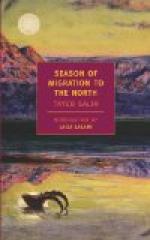It has been a full day, and by the way the “permits” are opening up in the settlement when we come back, promises to be a full night. These men have waited a whole year for a drink, and now the lids can’t come off quick enough. “Come, hurry up, Flynn, we’re all as dry as wooden gods, we’re so dry that we’re brittle—we’d break if you hit us.” “Well, I’m hurrying; I’m as much in a rush as any of you; I’m so warped the hoops are falling off.”
It doesn’t take long to polish off the permits proper (or improper). By morning all this liquor, imported for “medicinal purposes,” is gone. Whoever in Chipewyan is thoughtless enough to get ill during the next twelve months must fall back on the medicine-chest of the English Mission or of the Grey Nuns. Anything strong will do for the creation of joyousness during the remaining three hundred and sixty-four days of the year—Jamaica ginger, lavender-water, flavouring extracts.
Next morning the bon vivants of Chipewyan are down to essences of lemon, vanilla, and ginger, which have been specially imported as stimulating beverages. We ask if they are any good. “Good? I should say so, and one bottle just makes a drink. Can I offer” (politely) “to exhilarate you ladies with vanilla?” The most jovial of the celebrants tells of his early imbibition of red ink. “I used to get a gallon of red ink with my outfit every year, and it gives you the good feel, but when this new Commissioner comes in he writes, ’I don’t see how you can use a gallon of red ink at your post in one year,’ and I writes back, ’What we don’t use we abuse,’ and next year he writes to me, ’It’s the abuse we complain of,’ and, with regretful reminiscence, “I got no more red ink.” The substitution of red tape for the carmine fluid that inebriates is an innovation not appreciated.
The old records fascinate us. We spend every spare moment before the coming of the treaty party in transcribing choice bits from them. There were drinks and drinkers in these old days.
“1830, Friday 1st. January. All hands came as is customary to wish us the compliments of the season, and they were treated with cakes each, a pipe, and two feet tobacco. In the evening they have the use of the hall to dance, and are regaled with a beverage.”
“1830, April 30. Poitras, a Chipewyan half-breed, arrived, and delivered 81 made beavers in prime furs, though he says he has been sickly all winter. I therefore presented him with a complete clothing and a Feather.”
“1830, May 16th. One of our Indians having been in company with Indians from Isle a la Crosse got married to one of their young women, consequently has followed the father-in-law and taken his hunt away from us.”
“1830, August 13th. One Indian, The Rat, passed us on the Portage, he was treated with a dram for ‘Old Acquaintance’ sake.”
On New Year’s Eve the old chronicler drops into verse. In tall thin letters in faded ink we read,




